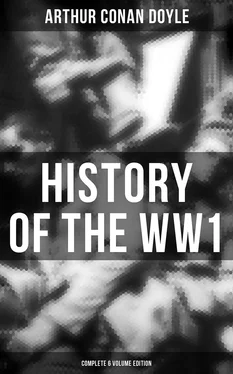In this connection one may allude to the so-called secret military engagements which were found and published by the Germans at Brussels and which were supposed to show that Great Britain herself contemplated the infraction of Belgian neutrality. One can only realise how bankrupt is Germany of all reason and argument when one considers such a contention as this. For years the German threats had been obvious to all the world. They had brought their strategic railways to the frontier of Belgium, and erected their standing camps there. Naturally Belgium was alarmed at such preparations and took counsel with Great Britain how her pledge should be redeemed and how her soil could be defended in case Germany proved perfidious. It was a simple military precaution which involved not the breach of a treaty but the fulfilment of one—not the invasion of Belgium but its protection after it was invaded. Each successive so-called “revelation ” about the actions of Great Britain has only proved once more that —
“Whatever record leaps to light
She never shall be shamed.”
These attempts to confuse the issue irresistibly recall the message of Frederic to Podowils when he The was about to seize Silesia even as William seized Belgium. “The question of right,” he said, “is the affair of ministers. It is your affair. It is time to work at it in secret, for the orders to the troops are given.” March first and find some justification later.
Germany would have stood higher in the world’s esteem and in the estimate of history if, instead of playing in most grotesque fashion the wolf to the lamb, and accusing her unprepared and distracted neighbours of making a surprise attack upon her at the moment when she was at the height of her preparations, she had boldly stated her true position. Her dignity and frankness would have been undeniable if she had said, “I am a great power. I believe I am the greatest. I am willing to put it to the test of war. I am not satisfied with my geographical position. I desire a greater seaboard. You must give it to me or I shall take it. I justify my action by the fact that the position of every state rests ultimately upon its strength in war, and that I am willing to undergo that test.”
Such a contention would have commanded respect, however much we might resent it. But these repeated declarations from the Emperor himself, the Chancellor, and so many others that they were deliberately attacked, coupled with appeals to the Almighty, make up the most nauseous mixture of falsehood and blasphemy which the world has ever known. The whole conception of religion became grotesque, and the Almighty, instead of a universal Father of the human race, was suddenly transformed into “our good old God,” a bloodthirsty tribal deity worthy of those Prussian pagans who as late as the fourteenth century offered human sacrifices to their idols in the Eastern Mark. The phenomenon was part of that general national madness to which, it is to be hoped, the German of the future will look back with bewilderment and shame.
One contention put forward by certain German apologists in connection with the war would hardly be worth referring to, were it not for the singular light which it casts upon the mental and moral position of a large number of the German public. It was that some special culture had been evolved by Germany which was of such value that it should be imposed by force upon the rest of the world. Since culture must in its nature be an international thing, the joint product of human development, such a claim can only be regarded as a conspicuous sign of its absence. In spiritual and intellectual matters it could not be asserted that Germany since 1870 had shown any superiority over France or England. In many matters she was conspicuously behind. It might fairly be claimed that in chemistry, in music, and in some forms of criticism, notably biblical exegesis, she was supreme. But in how many fields was she inferior to Great Britain? What name had she in poetry to put against Tennyson and Browning, in zoology to compare with Darwin, in scientific surgery to excel that of Lister, in travel to balance Stanley, or in the higher human qualities to equal such a man as Gordon? The fruits of German culture do not bear out the claim that it should forcibly supplant that of either of the great Western nations.
We have now seen how the great cloud which had hung so long over Europe burst at last, and the blast of war swept the land from end to end. We have passed through the years of hopes and alarms, of the ententes of optimists and the detentes of politicians, of skirmishes between journals and wrestles of finance, until we reach the end of it all — open primitive warfare between the two great branches of the Germanic family. In a purple passage Professor Cramb spoke of the days when the high gods of virility would smile as they looked down upon the chosen children of Odin, the English and the Germans, locked in the joy of battle. The hour had struck, and it is a partial record of those crowded and heroic days which is here set forth with such accuracy of detail as diligence may command and circumstances allow.
II. The Opening of the War
Table of Contents
There can be no doubt that if Germany had confined her operations to an attack upon France without any infraction of Belgian neutrality, the situation in Great Britain would have been extraordinarily difficult. The Government was the most democratic that has ever been known in our political history, and it owed its power to an electorate, many of whom were passionate advocates for peace at almost any conceivable price. The preparations for naval war, necessitated by the ever-growing German power, had been accompanied and occasionally retarded by a constant murmur of remonstrance which swelled periodically into a menacing expostulation. McKenna and Churchill found their only opponents in the members of their own party, who persistently refused to look obvious facts in the face, and impatiently swept aside the figures of the German armaments while they indulged in vague and amiable aspirations towards international friendship. This large and energetic party would certainly have most strenuously resisted British interference in a Continental war. The statesmen who foresaw that the conquest of France would surely lead to the conquest of Britain might have carried the country with them, but none the less they would have gone to war with such an incubus upon them as the traitorous Charles James Fox and his party had been in the days of Napoleon. A disunited British against a united German Empire would have been a grievous disadvantage, be our allies who they might, for, as Shakespeare sang, “If England to herself be true,” it is then only that she is formidable.
This great misfortune, however, was obviated by the policy of Germany. The most peace-loving Briton could not face the national dishonour which would have been eternally branded upon him had his country without an effort allowed its guarantee to be treated as waste paper by a great military nation. The whole people were welded into one, and save for a few freakish individuals who obeyed their own perversity of mind or passion for notoriety, the country was united as it has never been in history. A just war seemed to touch the land with some magic wand, which healed all dissensions and merged into one national whole those vivid controversies which are, in fact, a sign rather of intense vitality than of degeneration. In a moment the faddist forgot his fad, the capitalist his grievance against taxation, the Labour man his feud against Capital, the Tory his hatred of the Government, even the woman her craving for the vote. A political millennium seemed to have dawned. Best and most important of all was the evident sign that the work done of late years to win the friendship of Ireland had not been in vain. If the mere promise of domestic institutions has ranged all responsible Irishmen upon one side on the day of battle, what may we not hope for ourselves and for the Empire when they have been fully established and Time has alleviated the last lingering memories of an evil past? It is true that at a later period of the war this fair prospect was somewhat overcast by an insane rebellion, in which the wrongs of Ireland, once formidable and now trivial, were allowed by a colossal selfishness to outweigh the martyrdom of Belgium and the mutilation of France. Still the fact remains (and it must sustain us in our future efforts for conciliation) that never before have we had the representative nationalists of Ireland as our allies in a great struggle.
Читать дальше












